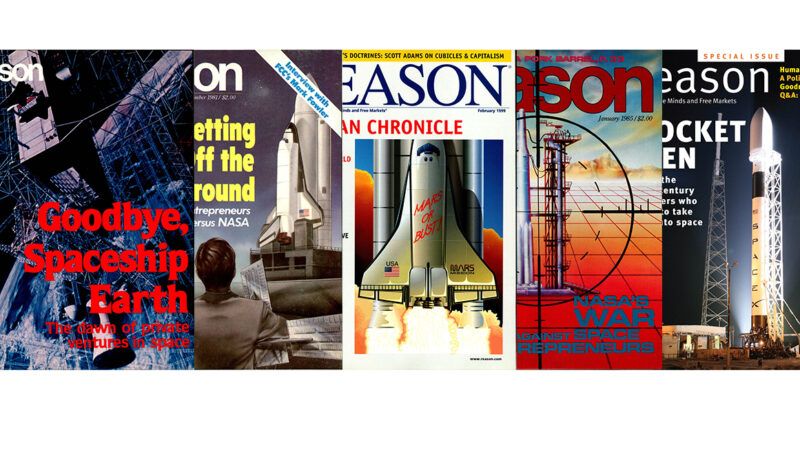Archives: December 2022
Excerpts from Reason's vaults

10 years ago
February 2012
"Human spaceflight in America got off on the wrong foot, born as it was in the national Cold War panic over Sputnik and the space race with the Soviet Union. In our rush to beat the godless commies, instead of focusing on the steady long-term establishment of a competitive launch industry that would eventually make spaceflight affordable, Americans used unreliable ballistic missiles to transport people into orbit. With the 'success' of Apollo, false lessons were cemented into place. We achieved John F. Kennedy's goal of landing a man on the moon and returning him to Earth before the decade was done, but in doing so we created a space policy monster."
Rand Simberg
"A Twinkle of Hope"
23 years ago
February 1999
"A desolate planet free of earthly institutions is more appealing to libertarians than it is to the corporate elite, just as the New World was more appealing to the Pilgrims and other contrarians than it was to the European aristocracy. It will take some doing to settle Mars, but libertarians have a crucial advantage. They're not expecting government bureaucrats to do the job. They know better than to count on NASA."
John Tierney
"Martian Chronicle"
37 years ago
January 1985
"NASA's first concern is not to maximize its overall cost-effectiveness but to avoid politically risky errors that could lead Congress to cut its budget. And for NASA's contractors, too, the reflex to avoid political risks is second nature.
'This is caused not simply by individual decisions to reduce risks, regardless of cost,' points out Eric Drexler of the Massachusetts Institute of Technology. 'This pattern is ingrained into the structure of government-funded development organizations, into the way they operate.' And Drexler drives home the point: 'There need be no money-wasting devils to result in a devilish waste of money.'"
Patrick Cox
"Space Entrepreneurs"
41 years ago
November 1981
"What does space offer to individuals and firms? Today, indispensable communications relays, weather data, information about earth resources; tomorrow, new benefits such as solar power satellites, industrial and pharmaceutical processing activities, new and more sophisticated communication relays, nonterrestrial sources of raw materials—and, if our hindsight about other new vistas is any indication, possibilities we have not yet even envisioned.
Poised to make the most of the possibilities is an emerging private space industry. Nowadays, it is often feared that Americans have lost their ability to compete in new, risky, high-technology ventures. Yet there are plenty of space entrepreneurs champing at the bit to do just that. Whether or not they get their chance—and the potential benefits of space transportation and development come to be realized—depends on the course taken by the federal government."
James Bennett
"The Second Space Race"
43 years ago
April 1979
"Throughout the '70s we grew accustomed to thinking of outer space as theater. The Apollo landings, the Viking Mars missions, planetary fly-bys—all were interesting entertainment, both for the TV-watching public and the publicly supported scientists who designed the on-board experiments. But the scientists and engineers planning the space projects of the '80s speak the language of the entrepreneur—rates of return, payback periods, cost per pound—as well as that of the technologist."
Robert Poole
"There's a New Age Dawning"
"First, such a move would provide 'global insurance' for human civilization and for terrestrial life (including a wide variety of life forms besides Homo sapiens)—insurance against total extinction by a global catastrophe of either human or natural origin. Second, space industrialization can counter the adverse environmental impact of terrestrial mining and manufacturing, even beyond the improvements we will obtain once we cease mining of fossil hydrocarbons for energy. Third, the move into space will provide satisfaction for the very real human need to explore."
Peter Vajk
"No More Doomsday"politics


Show Comments (3)